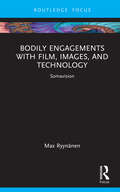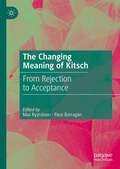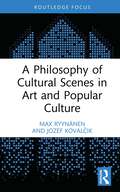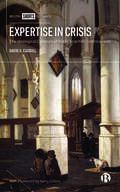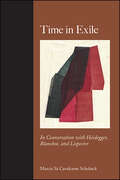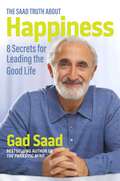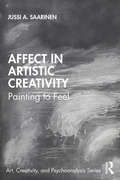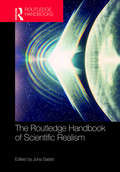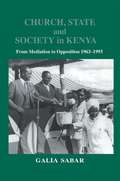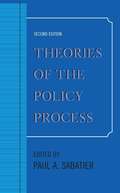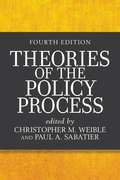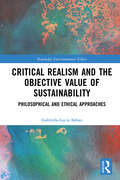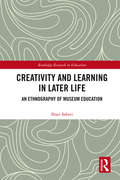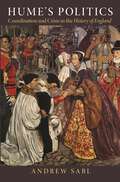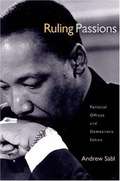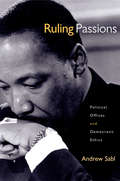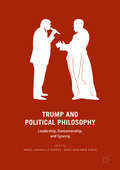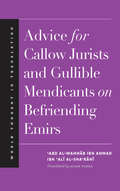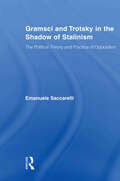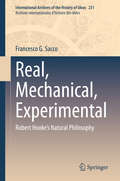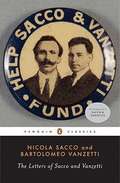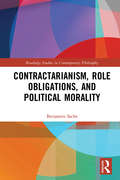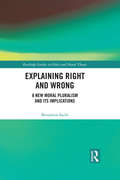- Table View
- List View
Bodily Engagements with Film, Images, and Technology: Somavision (Routledge Focus on Art History and Visual Studies)
by Max RyynänenThis book builds a new understanding of the body and its relationship to images and technology, using a framework where novel writings of pragmatist somaesthetics and phenomenology meet new research on bodily reactions. Max Ryynänen gives an overview of the topic by collecting the existing information of our bodies gazing at visual culture and the philosophies supporting these phenomena, and examines the way the gaze and the body come together in our relationship to culture. Themes covered include somatic film; the body in artistic documentation of activist art; body parts (and their mutilation or surgeries) in contemporary art and film; robot cars and our visual relationship to them; the usefulness of Indian rass philosophy in explaining digital culture; and an examination of Mario Perniola’s work about the idea that we, human beings, are increasingly experiencing ourselves to be simply "things." The book will be of interest to scholars working in art history, aesthetics, cultural philosophy, film studies, technology studies, media studies, cultural studies, and visual studies.
The Changing Meaning of Kitsch: From Rejection to Acceptance
by Max Ryynänen Paco BarragánThis book inaugurates a new phase in kitsch studies. Kitsch, an aesthetic slur of the 19th and the 20th century, is increasingly considered a positive term and at the heart of today’s society. Eleven distinguished authors from philosophy, cultural studies and the arts discuss a wide range of topics including beauty, fashion, kitsch in the context of mourning, bio-art, visual arts, architecture and political kitsch. In addition, the editors provide a concise theoretical introduction to the volume and the subject. The role of kitsch in contemporary culture and society is innovatively explored and the volume aims not to condemn but to accept and understand why kitsch has become acceptable today.
A Philosophy of Cultural Scenes in Art and Popular Culture (Routledge Focus on Art History and Visual Studies)
by Max Ryynänen Jozef KovalčikThis book seeks to understand culture through the lens of scenes, analyzing them aesthetically and culturally as well as understanding them through the frameworks of gender, social networks, and artworlds. It is common to talk about the cultural and intellectual scenes of early twentieth-century Vienna, the visual art scene of postwar New York, and the music and fashion scene of the swinging London. We often think about artists and works of art as essentially belonging to a certain scene. Scenes might offer a new approach to study what is possible, what is a tradition, and/or to discuss what are the relevant units of contemporary culture for research. The book posits that scenes explain a lot about how the artworld and the cultural field function. Vivienne Westwood, Rene Magritte, Roman Jakobson, Arthur C. Danto, Susan Sontag, James Baldwin, and Didier Eribon are among the figures included in the book, which examines scenes in cities such as Moscow, Bombay, New York, London, Paris, Brussels, Helsinki, and Bratislava. The book will be of interest to scholars working in art history, cultural studies, philosophy, film, literature, and urban studies.
Expertise in Crisis: The Ideological Contours of Public Scientific Controversies
by David S. CaudillWhen the utility of masks or vaccinations became politicized during the COVID-19 pandemic and lost its mooring in scientific evidence, an already-developing crisis of expertise was exacerbated. Those who believe in consensus science wondered: “How can ‘those people’ not see the truth?” With a foreword by Harry Collins, this book shows that the crisis is not a scientific controversy, but an ideological dispute with believers on both sides. If the advocates for consensus science acknowledge the uncertainties involved, rather than insisting on cold, hard facts, it is possible to open a pathway towards interaction and communication, even persuasion, between world views. As the crisis of expertise continues to be a global issue, this will be an invaluable resource for readers concerned about polarized societies and the distrust of consensus science.
Time in Exile: In Conversation with Heidegger, Blanchot, and Lispector (SUNY series, Intersections: Philosophy and Critical Theory)
by Marcia Sá Cavalcante SchubackThis book is a philosophical reflection on the experience of time from within exile. Its focus on temporality is unique, as most literature on exile focuses on the experience of space, as exile involves dislocation, and moods of nostalgia and utopia. Marcia Sá Cavalcante Schuback proposes that in exile, time is experienced neither as longing back to the lost past nor as wanting a future to come but rather as a present without anchors or supports. She articulates this present as a "gerundive" mode, in which the one who is in exile discovers herself simply being, exposed to the uncanny experience of having lost the past and not having a future. To explore this, she establishes a conversation among three authors whose work has exemplified this sense of gerundive time: the German philosopher Martin Heidegger, the French writer and essayist Maurice Blanchot, and the Brazilian writer Clarice Lispector. The book does not aim to discuss how these authors understand the relation between time and exile, but presents a conversation with them in relation to this question that reflects new aspects in their work. Attempting to think and express this difficult sense of time from within exile, Time in Exile engages with the relation between thought and language, and between philosophy and literature. Departing from concrete existential questions, Sá Cavalcante Schuback reveals new philosophical and theoretical modes to understand what it means to be present in times of exile.
The Saad Truth about Happiness: 8 Secrets for Leading the Good Life
by Gad SaadThe Quest for Happiness Is a Universal Fact.It is a scientific fact, which means we can measure happiness, we can assess it, and we can devise strategies to make ourselves happy and fulfilled human beings. So says Professor Gad Saad, the author of the sensational bestseller The Parasitic Mind and the irrepressible host of The Saad Truth podcast. In this provocative, entertaining, and life-changing new book, he roams through the scientific studies, culls the wisdom of ancient philosophy and religion, and draws on his extraordinary personal experience as a refugee from war-torn Lebanon turned academic celebrity. In The Saad Truth about Happiness you&’ll learn the secrets to living the good life, including: • How to live the life you want—not necessarily the life expected of you • Why resilience is a key to happiness • Why your career needs to have a higher purpose than a paycheck • Why variety truly can be the spice of life • Why choosing the right spouse is so important • Why Aristotle had it right when he preached moderation • Why you should take a hint from your dog and realize that playfulness equals happiness The Saad Truth about Happiness is as lively, stimulating, and captivating as its author, who has become a "de facto global therapist" to an ever-growing audience of hundreds of thousands of people. Read this book and you&’ll see why so many seek his counsel.
Affect in Artistic Creativity: Painting to Feel (Art, Creativity, and Psychoanalysis Book Series)
by Jussi SaarinenWhy do painters paint? Obviously, there are numerous possible reasons. They paint to create images for others’ enjoyment, to solve visual problems, to convey ideas, and to contribute to a rich artistic tradition. This book argues that there is yet another, crucially important but often overlooked reason. Painters paint to feel. They paint because it enables them to experience special feelings, such as being absorbed in creative play and connected to something vitally significant. Painting may even transform the painter’s whole sense of being. Thus, painting is not only about producing art, communicating content, and so on, but also about setting up and inhabiting an experiential space wherein highly valued feelings are interactively enabled and supported. This book investigates how and why this happens by combining psychoanalytical theorization on creativity with philosophical thinking on affectivity. It focuses on creative experience itself, and illuminates the psychological mechanisms and dynamics that underlie the affects at stake. Painters’ own descriptions of how they feel at work are used throughout to give an accurate, true-to-life portrayal of the experience of painting. The strength of the book lies in its open-minded yet critical integration of contemporary psychoanalytic and philosophical thinking, and in its truthfulness to painters’ experiential descriptions of the painterly process. On the whole, it enriches our understanding of artistic creativity and sheds more light on how and why we come to feel the things we do. As such, the book will appeal to philosophers, psychoanalysts, and art researchers alike.
The Routledge Handbook of Scientific Realism (Routledge Handbooks in Philosophy)
by Juha SaatsiScientific realism is a central, long-standing, and hotly debated topic in philosophy of science. Debates about scientific realism concern the very nature and extent of scientific knowledge and progress. Scientific realists defend a positive epistemic attitude towards our best theories and models regarding how they represent the world that is unobservable to our naked senses. Various realist theses are under sceptical fire from scientific antirealists, e.g. empiricists and instrumentalists. The different dimensions of the ensuing debate centrally connect to numerous other topics in philosophy of science and beyond. The Routledge Handbook of Scientific Realism is an outstanding reference source – the first collection of its kind – to the key issues, positions, and arguments in this important topic. Its thirty-four chapters, written by a team of international experts, are divided into five parts: Historical development of the realist stance Classic debate: core issues and positions Perspectives on contemporary debates The realism debate in disciplinary context Broader reflections In these sections, the core issues and debates presented, analysed, and set into broader historical and disciplinary contexts. The central issues covered include motivations and arguments for realism; challenges to realism from underdetermination and history of science; different variants of realism; the connection of realism to relativism and perspectivism; and the relationship between realism, metaphysics, and epistemology. The Routledge Handbook of Scientific Realism is essential reading for students and researchers in philosophy of science. It will also be very useful for anyone interested in the nature and extent of scientific knowledge.
Church, State and Society in Kenya: From Mediation to Opposition
by Galia SabarThis volume offers a debate on the role of Christianity in post-colonial Kenya, charting the role of the church, state and society in the transformation of Kenya and the relationship between the three. It shows how the church initiated health, education, and economic activities, showing it to be a major instrument of transformation.
Theories of the Policy Process
by Paul A SabatierTheories of the Policy Process provides a forum for the proponents of several of the most promising and widely used theoretical frameworks to present the basic propositions of their frameworks, to assess the empirical evidence that has developed, and to discuss promising directions for future research. The first edition contained analyses of Institutional Rational Choice (Ostrom), Multiple Streams (Zahariadis), Punctuated Equilibrium (Jones et al.), Advocacy Coalition Framework (Sabatier and Jenkins-Smith), and Policy Diffusion (Berry and Berry). The second edition revises these and adds new chapters on Social Construction and Policy Design (Schneider et al.) and Policy Networks (Adam and Kriesi). It also contains a much more serious analysis of the European literature relevant to each of the frameworks. Finally, the new edition contains a revised chapter by Edella Schlager, presenting a comparative analysis and evaluation of the relevant frameworks, and a concluding chapter by the editor suggesting a number of strategies for improving the state of theorizing in this field.
Theories of the Policy Process, Second Edition
by Paul A. SabatierTheories of the Policy Process provides a forum for the proponents of several of the most promising and widely used theoretical frameworks to present the basic propositions of their frameworks, to assess the empirical evidence that has developed, and to discuss promising directions for future research. The first edition contained analyses of Institutional Rational Choice (Ostrom), Multiple Streams (Zahariadis), Punctuated Equilibrium (Jones et al.), Advocacy Coalition Framework (Sabatier and Jenkins-Smith), and Policy Diffusion (Berry and Berry). The second edition revises these and adds new chapters on Social Construction and Policy Design (Schneider et al.) and Policy Networks (Adam and Kriesi). It also contains a much more serious analysis of the European literature relevant to each of the frameworks. Finally, the new edition contains a revised chapter by Edella Schlager, presenting a comparative analysis and evaluation of the relevant frameworks, and a concluding chapter by the editor suggesting a number of strategies for improving the state of theorizing in this field.
Theories of the Policy Process
by Paul A Sabatier Christopher M WeibleA comprehensive primer to the major contemporary theoretical frameworks used in policy process research written by leading public policy scholars.
Critical Realism and the Objective Value of Sustainability: Philosophical and Ethical Approaches (Routledge Environmental Ethics)
by Gabriela-Lucia SabauCritical Realism and the Objective Value of Sustainability contributes to the growing discussion surrounding the concept of sustainability, using a critical realist approach within a transdisciplinary theoretical framework to examine how sustainability objectively occurs in the natural world and in society. The book develops an ethical theory of sustainability as an objective value, rooted not in humans’ subjective preferences but in the holistic web of relationships, interdependencies, and obligations existing among living things on Earth, a web believed to have maintained life on Earth over the last 3.7 billion years. It proposes three pillars of sustainability ethics: contentment for the human existence given to us; justice (beyond distributive justice); and meaningful freedom (within ecological and moral limits). Using abductive reasoning, the book infers that there is an out-of-this-world Sustainer behind the Earth’s sustainability acting as a metaphysical source of all being and value. It argues that sustainability value, accepted as a shared understanding of the common good, must guide individual decisions and socio-economic development efforts as a matter of deliberate choice, as well as be built on the awareness that there are non-negotiable, pre-established conditions for our planet’s sustainability. This book will be of interest to students and scholars across fields of inquiry, including sustainability, sustainable development, environmental philosophy and ethics, philosophy of science, and ecological economics, and to whoever may wonder why seasons exists and why humans have creative minds.
Creativity and Learning in Later Life: An Ethnography of Museum Education (Routledge Research in Education)
by Shari SabetiCreativity and Learning in Later Life examines how processes such as ‘creativity’ and ‘inspiration’ are experienced by writers who engage with the visual arts, and questions how age is perceived in relation to these processes. The author’s careful analysis challenges many of the assumptions on which museum education currently operates, contributing to wider debates surrounding the value of arts and cultural heritage education. Containing detailed descriptions of museum tours, viewers’ engagements with specific artworks, and the processes of creative writing and editing that result from such encounters, the book draws on a ground-breaking study to challenge the way in which the value of education and creative activity for older adult learners has been conceptualized in existing literature. It also demonstrates how learners adapt and subvert the intended pedagogies to suit their own needs and accommodate their ageing selves. Drawing on a spectrum of disciplines including education, anthropology, art history, sociology, museum studies and the practice and theory of creative writing, this book will be of interest to academics, postgraduate students, and researchers in a range of fields, as well museum practitioners, creative writing teachers and those working in adult and community education settings.
Hume's Politics: Coordination and Crisis in the History of England
by Andrew SablHume's Politics provides a comprehensive examination of David Hume's political theory, and is the first book to focus on Hume's monumental History of England as the key to his distinctly political ideas. Andrew Sabl argues that conventions of authority are the main building blocks of Humean politics, and explores how the History addresses political change and disequilibrium through a dynamic treatment of coordination problems. Dynamic coordination, as employed in Hume's work, explains how conventions of political authority arise, change, adapt to new social and economic conditions, improve or decay, and die. Sabl shows how Humean constitutional conservatism need not hinder--and may in fact facilitate--change and improvement in economic, social, and cultural life. He also identifies how Humean liberalism can offer a systematic alternative to neo-Kantian approaches to politics and liberal theory. At once scholarly and accessibly written, Hume's Politics builds bridges between political theory and political science. It treats issues of concern to both fields, including the prehistory of political coordination, the obstacles that must be overcome in order for citizens to see themselves as sharing common political interests, the close and counterintuitive relationship between governmental authority and civic allegiance, the strategic ethics of political crisis and constitutional change, and the ways in which the biases and injustices endemic to executive power can be corrected by legislative contestation and debate.
Ruling Passions: Political Offices and Democratic Ethics
by Andrew SablHow should politicians act? When should they try to lead public opinion and when should they follow it? Should politicians see themselves as experts, whose opinions have greater authority than other people's, or as participants in a common dialogue with ordinary citizens? When do virtues like toleration and willingness to compromise deteriorate into moral weakness? In this innovative work, Andrew Sabl answers these questions by exploring what a democratic polity needs from its leaders. He concludes that there are systematic, principled reasons for the holders of divergent political offices or roles to act differently. Sabl argues that the morally committed civil rights activist, the elected representative pursuing legislative results, and the grassroots organizer determined to empower ordinary citizens all have crucial democratic functions. But they are different functions, calling for different practices and different qualities of political character. To make this case, he draws on political theory, moral philosophy, leadership studies, and biographical examples ranging from Everett Dirksen to Ella Baker, Frances Willard to Stokely Carmichael, Martin Luther King Jr. to Joe McCarthy. Ruling Passions asks democratic theorists to pay more attention to the "governing pluralism" that characterizes a diverse, complex democracy. It challenges moral philosophy to adapt its prescriptions to the real requirements of democratic life, to pay more attention to the virtues of political compromise and the varieties of human character. And it calls on all democratic citizens to appreciate "democratic constancy": the limited yet serious standard of ethical character to which imperfect democratic citizens may rightly hold their leaders--and themselves.
Ruling Passions: Political Offices and Democratic Ethics
by Andrew SablHow should politicians act? When should they try to lead public opinion and when should they follow it? Should politicians see themselves as experts, whose opinions have greater authority than other people's, or as participants in a common dialogue with ordinary citizens? When do virtues like toleration and willingness to compromise deteriorate into moral weakness? In this innovative work, Andrew Sabl answers these questions by exploring what a democratic polity needs from its leaders. He concludes that there are systematic, principled reasons for the holders of divergent political offices or roles to act differently. Sabl argues that the morally committed civil rights activist, the elected representative pursuing legislative results, and the grassroots organizer determined to empower ordinary citizens all have crucial democratic functions. But they are different functions, calling for different practices and different qualities of political character. To make this case, he draws on political theory, moral philosophy, leadership studies, and biographical examples ranging from Everett Dirksen to Ella Baker, Frances Willard to Stokely Carmichael, Martin Luther King Jr. to Joe McCarthy. Ruling Passions asks democratic theorists to pay more attention to the "governing pluralism" that characterizes a diverse, complex democracy. It challenges moral philosophy to adapt its prescriptions to the real requirements of democratic life, to pay more attention to the virtues of political compromise and the varieties of human character. And it calls on all democratic citizens to appreciate "democratic constancy": the limited yet serious standard of ethical character to which imperfect democratic citizens may rightly hold their leaders--and themselves.
Trump and Political Philosophy: Leadership, Statesmanship, and Tyranny
by Marc Benjamin Sable Angel Jaramillo TorresThis book aims to recover from ancient and modern thinkers valuable arguments about statesmanship, leadership, and tyranny which illuminate reassessments of political science and practice after the election of Donald Trump. Like almost everyone else, contemporary political scientists were blind-sided by the rise of Trump. No one expected a candidate to win who repeatedly violated both political norms and the conventional wisdom about campaign best practices. Yet many of the puzzles that Trump’s rise presents have been examined by the great political philosophers of the past. For example, it would come as no surprise to Plato that by its very emphasis on popularity, democracy creates the potential for tyranny via demagoguery. And, perhaps no problem is more alien to empirical political science than asking if statesmanship entails virtue or if so, in what that virtue consists: This is a theme treated by Plato, Aristotle, and Machiavelli, among others. Covering a range of thinkers such as Confucius, Plutarch, Kant, Tocqueville, and Deleuze, the essays in this book then seek to place the rise of Trump and the nature of his political authority within a broader institutional context than is possible for mainstream political science.
Advice for Callow Jurists and Gullible Mendicants on Befriending Emirs
by Adam Sabra Abd al-Wahhab al-SharaniThis mirror for princes sheds light on the relationship between spiritual and political authority in early modern Egypt This guide to political behavior and expediency offers advice to Sufi shaykhs, or spiritual guides, on how to interact and negotiate with powerful secular officials, judges, and treasurers, or emirs. Translated into English for the first time, it is a unique account of the relationship between spiritual and political authority in late medieval / early modern Islamic society.
Gramsci and Trotsky in the Shadow of Stalinism: The Political Theory and Practice of Opposition
by Emanuele SaccarelliThis book examines the legacy of Antonio Gramsci and Leon Trotsky in the shadow of Stalinism in order to reassess the very different and distorted academic reception of the two figures, as well as to contribute to the revitalization of Marxism for our time. While Gramsci and Trotsky lived and died in a similar fashion, as revolutionary Marxist leaders and theoreticians, their reception in academia could not be more different. Gramsci has become tremendously popular, becoming a central figure in many disciplines, while Trotsky remains largely ignored. Saccarelli argues that not only is Gramsci popular for the wrong reasons--being routinely distorted and depoliticized--even when rescued from his contemporary users, Gramsci remains inadequate. Conversely, the fact that Trotsky remains beyond the pale of "theory" is a terrible indictment of the current state of academic thinking.
Real, Mechanical, Experimental: Robert Hooke's Natural Philosophy (International Archives of the History of Ideas Archives internationales d'histoire des idées #231)
by Francesco G. SaccoThis original work contains the first detailed account of the natural philosophy of Robert Hooke (1635-1703), leading figure of the early Royal Society. From celestial mechanics to microscopy, from optics to geology and biology, Hooke’s contributions to the Scientific Revolution proved decisive. Focusing separately on partial aspects of Hooke’s works, scholars have hitherto failed to see the unifying idea of the natural philosophy underlying them. Some of his unpublished papers have passed almost unnoticed. Hooke pursued the foundation of a real, mechanical and experimental philosophy, and this book is an attempt to reconstruct it. The book includes a selection of Hooke's unpublished papers. Readers will discover a study of the new science through the works of one of the most known protagonists. Challenging the current views on the scientific life of restoration England, this book sheds new light on the circulation of Baconian ideals and the mechanical philosophy in the early Royal Society. This book is a must-read to anybody interested in Hooke, early modern science or Restoration history.
The Letters of Sacco and Vanzetti
by Nicola Sacco Bartolomeo VanzettiCommemorating the eightieth anniversary of Sacco and Vanzetti's execution- with a new cover and new foreword Electrocuted in 1927 for the murder of two guards in Massachusetts, the Italian- American anarchists Nicola Sacco and Bartolomeo Vanzetti defied the verdict against them, maintaining their innocence to the end. Whether they were guilty continues to be the subject of debate today. First published in 1928, Sacco and Vanzetti's letters represent one of the great personal documents of the twentieth century: a volume of primary source material as famous for the splendor of its impassioned prose as for the brilliant light it sheds on the characters of the two dedicated anarchists who became the focus of worldwide attention. .
The Everything Zen (The Everything®)
by Jacky SachDo you find yourself restless and distracted by the hustle and bustle of the modern world? Have you sought comfort in possessions and acclaim only to be disappointed by their emptiness? If so, you are not along. The Everything Zen Book introduces you to thousands of years of ancient teachings that can help you achieve inner peace and unity with the world around you. Whether you are at home or in the office, this easy-to-follow guide shows you how to apply ancient Zen principles to every area of your life—from relationships and your career to artistic expression and your health.
Contractarianism, Role Obligations, and Political Morality (Routledge Studies in Contemporary Philosophy)
by Benjamin SachsThis book argues that contractarianism is well suited as a political morality and explores the implications of deploying it in this way. It promises to revive contractarianism as a viable political theory, breaking it free from its Rawlsian moorings while taking seriously the long-standing objections to it. It’s natural to think that the state owes things to its people: physical security, public health and sanitation services, and a functioning judiciary, for example. But is there a theory—a political morality—that can explain why this is so and who the state’s people are? This new contractarianism deploys a reversed state of nature thought experiment as the starting point of political theorizing. From this starting point it develops a political morality: a theory of the common ground of the role moralities attached to the various roles within the state. Contractarianism, so understood, can provide a basis for already popular ideas in political theory—such as political and legal liberalism—and overturn conventional wisdom, for example that the state is obligated to secure justice and that animals should have no legal standing. Contractarianism, Role Obligations, and Political Morality will be of interest to scholars and advanced students working in moral and political philosophy.
Explaining Right and Wrong: A New Moral Pluralism and Its Implications (Routledge Studies in Ethics and Moral Theory)
by Benjamin SachsExplaining Right and Wrong aims to shake the foundations of contemporary ethics by showing that moral philosophers have been deploying a mistaken methodology in their efforts to figure out the truth about what we morally ought to do. Benjamin Sachs argues that moral theorizing makes sense only if it is conceived of as an explanatory project and carried out accordingly. The book goes on to show that the most prominent forms of moral monism—consequentialism, Kantianism, and contractarianism/contractualism—as well as Rossian pluralism, each face devastating explanatory objections. It offers in place of these flawed options a brand-new family of normative ethical theories, non-Rossian pluralism. It then argues that the best kind of non-Rossian pluralism will be spare; in particular, it will deny that an action can be wrong in virtue of constituting a failure to distribute welfare in a particular way or that an action can be wrong in virtue of constituting a failure to rescue. Furthermore, it also aims to show that a great deal of contemporary writing on the distribution of health care resources in cases of scarcity is targeted at questions that either have no answers at all or none that ordinary moral theorizing can uncover.
